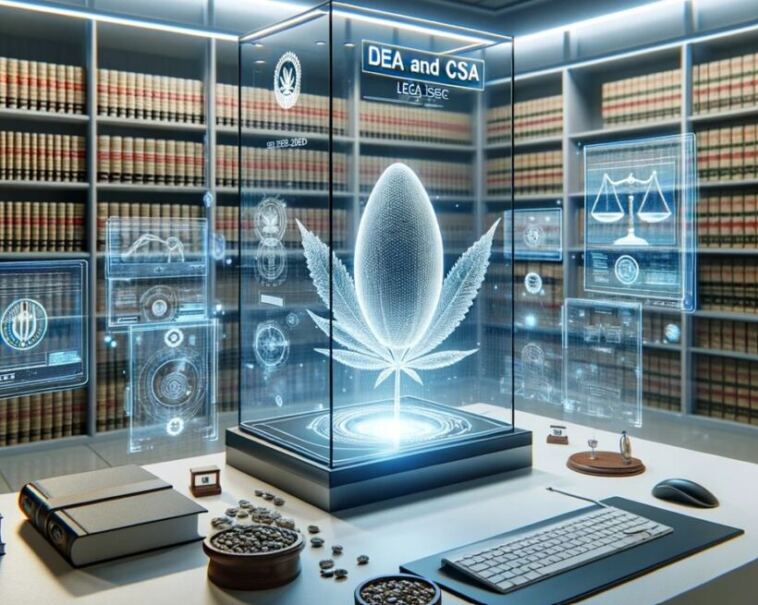- Like
- SHARE
- Digg
- Del
- Tumblr
- VKontakte
- Flattr
- Buffer
- Love This
- Save
- Odnoklassniki
- Meneame
- Blogger
- Amazon
- Yahoo Mail
- Gmail
- AOL
- Newsvine
- HackerNews
- Evernote
- MySpace
- Mail.ru
- Viadeo
- Line
- Comments
- Yummly
- SMS
- Viber
- Telegram
- JOIN
- Skype
- Facebook Messenger
- Kakao
- LiveJournal
- Yammer
- Edgar
- Fintel
- Mix
- Instapaper
- Copy Link
Introduction
The legal landscape surrounding cannabis in the United States is as complex as it is dynamic. At the heart of this complexity lies the legality of cannabis seeds, a topic that intertwines federal and state laws, the Controlled Substances Act (CSA), and the intricacies of the cannabis industry. This article aims to shed light on the often misunderstood regulations governing cannabis seeds, providing clarity for growers, consumers, and cannabis businesses alike.
What Are Cannabis Seeds and Why Does Their Legal Status Matter?
Cannabis seeds are more than just the beginning of a cannabis plant; they are the encapsulation of potential—potential that is deeply entwined with the legal fabric of the cannabis industry. These seeds, which can be as unassuming as any other seed, carry within them the genetic blueprint for the cannabis plant, including the controversial compound THC. While the seeds themselves do not induce psychoactive effects, their germination can lead to the growth of plants rich in THC, the primary psychoactive component in marijuana plants. This potential places cannabis seeds in a unique category, often leading to their classification as a controlled substance by the DEA.
The legal status of cannabis seeds is critical because it influences the entire spectrum of cannabis activities—from cultivation to sale. For instance, the purchase of cannabis seeds for the intent of growing still-prohibited marijuana plants can lead to legal problems, despite the seeds themselves being non-psychoactive. This legal ambiguity affects not only individual growers but also commercial cannabis businesses that may source genetics from seed banks or sell seeds online. Understanding whether cannabis seeds fall under the legal definition of marijuana or hemp is essential for anyone involved in the cannabis industry, whether for medical marijuana, adult-use cannabis, or hemp production.
How Does Federal Law Impact the Purchase of Marijuana Seeds?
Navigating the purchase of marijuana seeds is akin to walking a tightrope strung between the pillars of federal law and the burgeoning cannabis industry. Under the CSA, marijuana is listed as a Schedule I drug, which casts a shadow over the entire legality of cannabis seeds. This federal classification means that at the federal level, it is illegal to use any cannabis seeds with the intent of growing marijuana plants with psychoactive levels of THC.
However, the 2018 Farm Bill has carved out a legal haven for hemp—a variety of Cannabis sativa L.—by stipulating that any part of the cannabis plant, such as tissue culture and any other genetic material, that meets the definition of ‘hemp’ and thus contains no more than 0.3 percent THC on a dry weight basis, is legal. This pivotal legislation has created a bifurcated legal environment where the legality of purchasing seeds hinges on their potential to produce THC. It’s a nuanced distinction that has significant implications for those looking to purchase seeds, whether from an online seed bank or a brick-and-mortar dispensary.
State Law vs. Federal Law: Understanding the Cannabis Seed Dichotomy
The dichotomy between state and federal law in the realm of cannabis is one of the most confounding aspects of the industry. While a number of states have adopted progressive stances on cannabis, legalizing its use for medical and adult-use purposes, these state regulatory programs still require navigation within the overarching shadow of federal regulations. This state and federal law divide means that actions such as the sale of marijuana seeds or marijuana cultivation that are sanctioned by state law can still be considered federal criminal acts.
In states where cannabis is legal, consumers may legally purchase seeds for various uses of cannabis, including cultivation. However, state regulatory programs still require compliance with both state and federal law, which can be a complex dance. For example, while it may be legal under state law to obtain seeds from other licensed cultivators or to buy cannabis seeds from out of state, bringing the seeds across state lines could violate federal law. This legal complexity is further compounded when considering the sale of marijuana seeds online, where state and federal jurisdictions can blur.
Are Cannabis Seeds Considered a Controlled Substance Under the CSA?
The Controlled Substances Act (CSA) serves as the legislative fulcrum for America’s drug policy, meticulously categorizing various substances into schedules that dictate their legal handling. When it comes to cannabis seeds, the waters of legal classification under the CSA become murky. The DEA, which operates under the aegis of the CSA, has provided some clarity: seeds that maintain a THC concentration of no more than 0.3 percent on a dry weight basis align with the legal definition of hemp and are thus not ensnared in the CSA’s control schedules. This demarcation is crucial, as it separates what could be considered a legal hemp product from an illegal cannabis substance. However, this does not entirely lift the veil of ambiguity, as the intent of growing still-prohibited marijuana plants from these seeds could tip the scales back into illegal territory.
Can You Legally Buy Cannabis Seeds in Your State?
The patchwork of cannabis legislation across the United States renders the act of purchasing cannabis seeds a state-specific endeavor. In jurisdictions where cannabis has been given the green light, the transaction of cannabis seeds is typically sanctioned. Prospective buyers, often required to be of legal adult age, can engage in the purchase of cannabis seeds, provided they adhere to the state’s regulatory framework, which may include limitations on possession quantities. It is imperative for individuals to delve into the nuances of their state’s cannabis laws to ascertain the legality of such purchases. This is where the division of the DEA that oversees cannabis can offer guidance, though it’s always recommended to seek legal counsel for advice tailored to one’s circumstances.
How Do State Cannabis Laws Affect the Sale of Marijuana Seeds?
The influence of state cannabis laws on the sale of marijuana seeds is both direct and profound. In states that have embraced cannabis legalization, the commerce of marijuana seeds is meticulously regulated to ensure strict adherence to state statutes. These regulations are not monolithic; they can vary widely, with some states permitting the sale of seeds for the express purpose of cannabis cultivation, while others may restrict sales to serve as collectibles or for agricultural hemp use. The sale of marijuana seeds is often enveloped in a comprehensive legal framework that may encompass everything from the seeds’ provenance to the buyer’s intended use. This legal scaffolding is designed to uphold the state’s cannabis program while navigating the complex interplay with federal law, particularly the nuances of the CSA and the DEA’s enforcement priorities.
What Determines the Legal Status of Hemp Seeds vs. Marijuana Seeds?
The legal chasm between hemp and marijuana seeds is bridged by their THC content—a pivotal factor in their legal classification. The 2018 Farm Bill crystallized this distinction by stipulating that hemp seeds must maintain a THC concentration not exceeding 0.3 percent on a dry weight basis. This legal threshold demarcates the boundary between permissible hemp cultivation and the more stringently regulated marijuana seeds, which have the potential to germinate into plants with THC levels surpassing this limit. This distinction is not merely academic; it carries significant implications for the cannabis industry, influencing everything from the sale of marijuana seeds to the legal status of cannabis activities involving seed cultivation.
Navigating State and Federal Law: Is It Legal to Transport Cannabis Seeds Across State Lines?
The act of transporting cannabis seeds across state lines navigates a precarious legal tightrope. Under the current federal framework, hemp seeds that conform to the 0.3 percent THC threshold are afforded legal mobility. Conversely, marijuana seeds remain ensnared by federal prohibition, their transit deemed illicit regardless of the legal status of cannabis in the originating or destination state. This federal stance casts a long shadow over state regulatory programs and underscores the complex interplay between state and federal law, particularly for those seeking to purchase seeds from out of state or engage in the sale of marijuana seeds online.
Controlled Substances Act: What Does It Say About Cannabis Seeds?
The Controlled Substances Act, while silent on cannabis seeds specifically, has been interpreted by the DEA to exempt seeds that fall within the legal definition of hemp—those harboring no more than 0.3 percent THC on a dry weight basis. This interpretation, bolstered by legal analyses such as those from attorney Shane Pennington, suggests a tacit acknowledgment by the DEA’s Chemical Evaluation Section of the legality of hemp seeds. This nuanced understanding is critical for stakeholders in the cannabis seed market, as it delineates the boundaries of legal commerce and cultivation under the CSA.
The DEA’s Stance on Cannabis Seeds: What You Need to Know
The DEA’s stance on cannabis seeds is emblematic of the broader, intricate relationship between federal agencies and the evolving cannabis landscape. While the DEA’s enforcement of drug laws remains stringent, it has also adapted to legislative changes, recognizing the non-controlled status of seeds aligning with the federal definition of hemp. This acknowledgment does not equate to a carte blanche for cannabis seed activities; rather, it underscores the importance of compliance with both the letter and spirit of the law. For those in the cannabis business, this recognition is a beacon guiding the sale and cultivation of seeds, ensuring that such endeavors remain within the legal confines established by the DEA and the broader federal apparatus.
Conclusion: The Future of Cannabis Seed Laws in State and Federal Legislation
The legality of cannabis seeds in the USA remains a nuanced and evolving issue. As state laws continue to diverge from federal regulations, the cannabis industry must navigate a labyrinth of legal considerations. The DEA’s position, influenced by the CSA and the 2018 Farm Bill, provides a framework for understanding the current legal environment. However, the future of cannabis seed laws will likely be shaped by ongoing legislative changes and the continued advocacy for clearer regulations.
For cannabis businesses and enthusiasts, staying informed about the latest legal developments is essential. Whether you’re looking to buy cannabis seeds, start a cannabis business, or simply understand the legal landscape, knowledge is power. As the cannabis industry expands and evolves, the legal framework governing it is also expected to mature, potentially paving the way for a future where the legality of cannabis seeds is more clearly defined, making the process to buy cannabis seeds online in the USA more straightforward and reliable for enthusiasts and cultivators alike.


